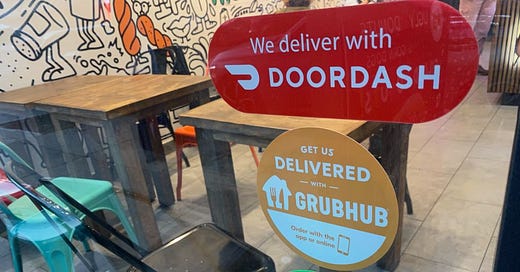DoorDash keeps going
Some newsy odds and ends: DoorDash's earnings win; Toast buys a drive-thru company; and LOL at McDonald's AI ordering
“It’s a little bit hard to tell precisely where the advantages are coming from,” a DoorDash spokesperson told the Wall Street Journal last week after the company posted a 40 percent revenue increase over last year. Its financial performance in the final three months of 2022 beat Wall Street expectations, sending its stock price higher in a market that… isn’t exactly up and to the right.
Though the company reported a net loss as usual, by using the standard adjusted accounting measure known as EBITDA (that’s earnings before interest, taxes, depreciation), it generated a quarterly record of $117 million. Still, using stock price as an overall indicator of the health of the business might not be the best idea; until market close on Thursday (when DoorDash issued its report), the price was down 30 percent from last year, and after a brief climb, it’s fallen since.
Meanwhile, federal lawmakers are showing renewed interest in DoorDash and its competition. Last week, lawmakers reportedly pressed company leaders about so-called “junk fees,” a term that’s gotten a lot of play since President Biden’s State of the Union address. They’re referring to the list of add-on fees to delivery orders.
Per coverage in the Washington Post:
“Consumers should not have to work through a confusing fee structure, deceptive offers and discounts, and potentially inflated prices while attempting to order a meal and support local businesses,” Sens. Ben Ray Luján (D-N.M.), Richard Blumenthal (D-Conn.) and Ron Wyden (D-Ore.) wrote in letters to the companies’ CEOs.
Spokespeople for the top US delivery companies, DoorDash, Grubhub, and Uber, all said some version of the same theme: these companies hare worked to make fees transparent and understandable so that consumers know where their money is going and why.
Up next (later this week) for paid subscribers:
You’re thinking about restaurant finance wrong.
Remember when office cafeterias were a huge work perk?
If a company called Zerocater has its way, they’ll become irrelevant. The startup just raised $15 million to expand beyond its current markets of New York City and the Bay Area. Currently Zerocater works with more than 450 food providers including restaurants, catering suppliers, and ghost kitchens to provide two services: a “Cloud Cafe" where people can pre-order boxed meals from a rotating selection and a “Managed Cafe,” which provides pre-ordered buffet-style offerings.
According to TechCrunch, Zerocater provides 10 daily cuisines and 70 daily menu items, with an overall of 20,000 unique menu items. “The pandemic and the shift to hybrid work completely broke how companies feed their teams,” Keith Kravcik, chief investment officer at Cleveland Avenue, which led the funding round, said in a statement. “Add in the current economic uncertainty and it is clear companies will no longer spend millions building out traditional cafeterias with full-time chefs, guessing what food and how much of it to prepare, and signing 5-year contracts when the in office headcount changes daily or another COVID outbreak could cause a shutdown.”
Given the shift to remote work and back again (sort of), lots of companies are grappling with lunch-as-a-perk. Ditching the corporate cafeteria will be a boon for companies like Zerocater, but also for local restaurants who might see an influx of orders from office dwellers. Years ago in San Francisco, a local group (including several restaurateurs) tried unsuccessfully to ban new corporate cafeterias in the city, citing a drop in lunch business. It didn’t work… maybe now’s the time?
Toast buys a drive-thru company
Toast, the point of sale and payments company for restaurants, just bought Delphi Display Systems, a company that makes digital displays and drive-thru tech— lots and lots of digital displays and drive-thru tech. (It’s in tens of thousands of locations around the world.) Terms of the deal weren’t disclosed.
Toast’s point of sale hardware has become a common sight at restaurants from formal, sit-down spots to order-at-the-counter neighborhood locations — and everything in between. The acquisition means Toast can also move its software outside the restaurant into the drive-thru lane, and as a bonus, it makes immediate inroads with enterprise (read: chain) restaurants instead of trying to build up that business on its own.
McDonald's new AI ordering system is bad for orders, good for LOLs
The chain announced a partnership with BMI in 2021 to expand and develop its Automated Order Taking (AOT) technology, with a goal of implementing the software in thousands of restaurants. So far, things aren’t going so well.
The upside? Good social media content. Several TikTok users have documented their attempts to order through AI gone awry. In one clip, a woman tries to order hash browns, sweet tea and a Coke. The AI, confused by a different order, ends up adding eight more (unwanted) sweet teas. Another user laughs while trying to stop the machine from adding hundreds of McNuggets to her order.
- Thanks to Danielle Hyams for contributing words and ideas this week as I worked through a school break with my children.





